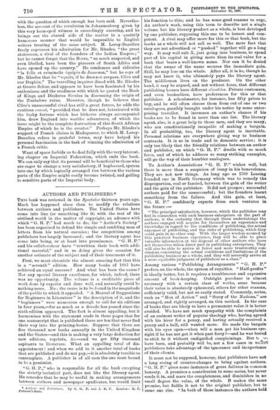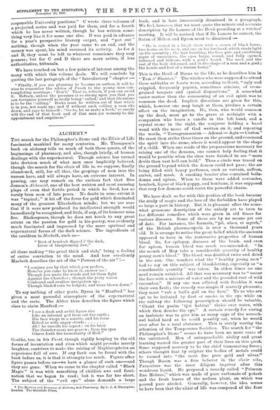AUTHORS AND PUBLISHERS.*
THIS book was reviewed in the Spectator thirteen years ago. Much has happened since then to modify the relations between authors and publishers. The United States have come into line (or something like it) with the rest of the civilised world in the matter of copyright, an advance with which " G. H. P." had much to do; the " Author's Society" has been organised to defend the simple and confiding man of letters from his natural enemies ; the competition among publishers has largely increased ; and the literary agent has come into being, or at least into prominence. "G. H. P." and his collaborateur have " rewritten their book with addi- tional material," and in so doing given the occasion for another estimate of the subject and of their treatment of it.
First, we must chronicle the almost amazing fact that this is a " seventh" edition. How many books of 1883 have achieved an equal success ? And what has been the cause ? Not any special literary excellence, for which, indeed, there was no opportunity. The volume is a creditable piece of work done by experts and done well, and naturally could be nothing more. No ; the cause is to be found in the magnitude of the public to which it appealed. " A Manual of Suggestions for Beginners in Literature" is the description of it, and the " beginners " were numerous enough to call for six editions in four years, for as much as a decade has passed since the sixth edition appeared. The fact is almost appalling, but it harmonises with the statement made in these pages that for one manuscript that is published there are ten that never find their way into the printing-house. Suppose that there are five thousand new books annually in the United Kingdom and the States—and this is making a very large deduction for new editions, reprints, &c.—and we get fifty thousand aspirants to literature. What an appalling total of dis- appointment ! and when we add to it another total of books that are published and do not pay,—it is absolutely terrible to contemplate. A publisher is of all men the one most bound to be a pessimist.
"G. H. P.," who is responsible for all the book excepting the strictly technical part, does not like the literary agent. He concedes that he may be useful in making arrangements between authors and newspaper syndicates, but would limit
• Authors and Publishers. By G. II. P. and J. B, P. London a G. P. Putnam's Oozes.
his function to this; and he has some good reasons to urge. An author's work, using this term to describe not a single volume but his literary product as a whole, is best developed by one publisher, supposing this one to be honest and com- petent. A rival may offer more for this or that book, but the books as a whole will not sell so well. The mere fact that they are not advertised or "pushed" together will go a long way. It may well suit X, just going into business, to spend part of his capital in giving more than its real value for a book that bears a well-known name. Nor can it be denied that the owner of the name secures the immediate gain.
Still, he may lose on the whole. After all, it is he, though he may not know it, who ultimately pays the literary agent.
The middleman lives on the producer. On the other hand, it may be argued, and not without force, that different publishing houses have different clienteles. Private customers, and even booksellers, have preferences for this or that publisher. A schoolmaster, for instance, has fifty prizes to buy, and he will often choose them from out of one or two catalogues, possibly brought under his notice by some enter- prising traveller. It increases an author's chance if his books are to be found in more than one list. The literary agent, also, is a great help to those men, and they are many, who are constitutionally incapable of making a bargain. In all probability, too, the literary agent is inevitable. Personal relations are everywhere giving way to business contracts. It is so in trade and in domestic service; it is only too likely that the friendly relations between an author and publisher, on which " G. H. P." dwells with so much force, and of which he adduces so many striking examples, will go the way of their humbler analogues.
To Author's Associations " G. H. P." wishes well, but there is more than a suspicion of irony in his benevolence. They are not new things. As long ago as 1768 Leasing founded one in North Germany which was to remedy the disproportion, real or fancied, between the gain of the writer and the gain of the publisher. It did not prosper; successful authors paid for the unsuccessful ; but the founders learnt something from the failure. And this gain, at least, " G. H. P." confidently expects from such ventures in the future :—
" The principal satisfaction, however, which the publisher may feel in connection with such business enterprises on the part of authors, is the certainty that through these undertakings the authors engaged will acquire for themselves an experience and knowledge in regard to the conditions of publishing, the actual expenses of publishing, and the risks of publishing, which they could gain in no other way. With the larger wisdom secured by this practical business experience, they will be able to place valuable information at the disposal of other authors who have not themselves taken direct part in publishing enterprises. They will also be able to arrive at fairer and more trustworthy con- clusions concerning the actual conditions and limitations of the publishing business as a whole, and they will assuredly arrive at a more equitable judgment of publishers as a class."
Among various " Publishing Arrangements " " G. H. P." prefers, on the whole, the system of royalties. "Half-profits" is ideally better, but it requires a troublesome and expensive amount of book-keeping. Outright purchase is almost necessary with a certain class of works, some because their value is absolutely ephemeral, others for other reasons, sufficiently valid, but not so easily stated. Commonly, series, such as "Men of Action" and " Story of the Nations," are• arranged, and rightly arranged, on this method. In the case of books that are likely to have a permanent value it is better avoided. We have not much sympathy with the complaints of an eminent writer of popular theology who, having agreed with his hirer for a penny, and having actually received a penny and a half, still wanted more. He made the bargain with his eyes open—when will a man get his business eye- sight if he has not got it when past forty?—and he was bound to stick to it without undignified complainings. But ti have been, and probably will be, not a few cases in wi.fart publishers take advantage of the ignorance and inexperience of their clients.
It must not be supposed, however, that publishers have not a long string of counter-charges to bring against authors. " G. H. P." gives some instances of gross failures in common honesty. A promises a contribution to some series, but never sends it in, and mars the completeness, and diminishes in no small degree the value, of the whole. B makes the same promise, but fulfils it not to the original publisher, but to
some one else. " In both of these instances the authors held.
responsible University positions." C wrote three volumes of a projected series and was paid for them, and for a fourth which he has never written, though he has written some- thing very like it for some one else. D was paid in advance for a year's prospective literary output, and "put out" nothing, though when the year came to an end, and the money was spent, his mind resumed its activity. As for A and B, they must be left to whatever conscience they may possess ; but for C and D there are more active, if less authoritative, tribunals.
We have touched on but a few points of interest among the many with which this volume deals. We will conclude by quoting the last paragraph of the "Introductory " chapter :-
" Finally, if you are planning to become an author, it will be wise to remember the advice of Punch to the young man con- templating marriage : ' Don't.' That is, refrain, if you can avoid it. Refrain, unless the pressure is so strong upon you that you can recognise yourself as really being' called,' and that literature is to be the `calling.' Books must be written out of that which is in you, not made up ; and if without such calling a man sits down, and says to himself : ` Go to, let us make a book,' so surely will the end of that book and of that man (or woman) be dis- appointment and emptiness."























































 Previous page
Previous page